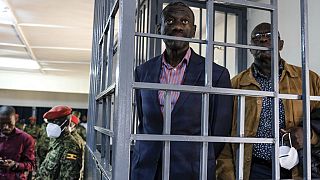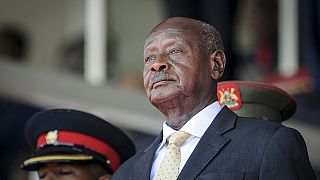Uganda
Draped in a traditional backcloth, a largely ritual outfit here in Uganda, Alex Wakitinti together with his son – his apprentice, strides towards a shrub adjacent to his house.
Here, Wakitinti kneels down besides a two-headed pot and start sprinkling some concoction seeds, a sign he says, is to request the gods to give us a safe passage into their sacred sites.
According to local officials of Buliisa district, there are some 32 sacred sites in the area where custodians go to consult the spirits whenever there is need in the community.
68-year-old Wakitinti is among some 25 cultural leaders known as custodians in the Bagungu community, who are allowed to perform cultural rituals or speak to the spirits.
But this lifestyle, which has been around for centuries, is now being threatened by the oil development in the Albertine area according to Wakitinti.
“Oil is there on the land as we have blood and water. Because the oil, which is there, plucking from ground it protects the cultural sites these are our trees.” Alex tells AP after presenting a sacrifice to one of his 12 sacred sites.
Since the discovery of commercial oil in the Albertine region, there has been little attention given to the threats the indigenous Bagungu people and their cultural sites face.
There are at least 32 sacred natural sites across Buliisa. They range from random trees in the bush to the rift in the land where the Nile River merges with Lake Albert, creating a spectacular landscape that intensifies the Bagungu's respect for nature.
These sites are repositories of occult mediums that the people consult for revelations or blessings. Problems ranging from a thief in the community to a sickness in the family are said to be solved there.
Local leaders weren’t quick to identify threats to sacred natural sites after the discovery of oil deposits, said Gilbert Tibasiima, the No.2 official in Buliisa. Others now regard the Bagungu’s concern over sacred sites as a nuisance that could only delay the start of oil production, he said.
“The discovery of oil and gas found people when they were not prepared for the industry. These are people who did not know the potential impact that would come with the oil and gas industry. Had they known earlier, probably maybe they could have developed their local means of preserving the environment in general including protection of their scared sites.” Gilbert says.
The Associated Press Ugandan team took time and visited the Bagungu community and the team were taken around some of these unmarked sacred sites.
Alex Wakitinti, while speaking to the AP, complained of the oil companies in his homeland that fail to see his importance as a chief custodian of sacred sites such as the tree under which he recently knelt to pray and present a bird's egg.
It’s a mistake, Wakitinti warned, to disrespect his spiritual work in a large swath of bushy grassland by Lake Albert that's become the hub of controversial efforts to make Uganda an oil producer by the end of this decade.
“According to their program of Total, custodians are not there to be facilitated or considered in any way, only those people who are saying they own the land are the people who are in their program. So for us we are not in their program we don’t have any expectations of getting anything from them.” Alex tells us.
This remote area near the Congo border, in which commercially viable quantities of oil were discovered in 2006, is home to fewer than 100,000 ethnic Bagungu, who are known for their strong traditional beliefs.
While the sacred natural sites remain largely intact, their territory has been encroached upon as TotalEnergies acquires more and more land, according to Wilson Kiiza, the founder of the Buliisa-based Bugungu Heritage and Information Centre.
“Oil companies believe they can pay for everything including sacred natural sites despite the fact that some custodians have categorically stated that you can’t relocate, you can’t transfer a scared place from one place to another.” Says Wilson Kiiza, who is fighting to preserve the cultural heritage of the Bagungu people.
Most families in the district of Buliisa maintain small shrines to ancestral spirits, visiting them regularly on matters not serious enough to warrant a more demanding trip to a sacred natural site.
Their beliefs are considered anomalous in a Christian-dominated country of 45 million people, contributing to the sense of injustice that's now driving a campaign by some local activists to preserve sacred natural sites threatened by oilfields.
The Buliisa assembly didn’t pass a bylaw to protect the Bagungu’s sacred natural sites until 2020.
That ordinance, which seeks to restrict access to such sites and proposes fines for disturbances, is yet to be ratified by the Ugandan attorney general’s office more than two years later – underscoring the prickly nature of the matter.
Some local NGOs now believe it is time these oil companies addressed the concerns of the communities.
“We think there should be constant discussions, constant dialogue between the oil developers and then the elders and custodians of scared natural sites so that they tell them the importance and significance of these scared natural sites to them – to their culture, to their clans and to their lives because they believe all their lives is dependent on these sacred natural sites.” Says Robert Turyomurugyendo Katemburura who works for the African Institute for Culture and Ecology.
Investors in Uganda’s oil fields over the years have ranged from the China National Offshore Oil Corporation to Irish firm Tullow Oil, which in 2020 completed the $575 million sale of its Ugandan assets to TotalEnergies. The company has since been under intense pressure to pull out.
A suit filed in Paris in June cites TotalEnergies' alleged failure to comply with France’s “duty of vigilance” law and seeks compensation for the company’s alleged violations of land and food rights over six years. TotalEnergies has long denied the charges, saying it is deploying state-of-the-art design — including horizontal drilling — to minimize ecological damage.












11:05
Africa's hight cost of climate change [Business Africa]
01:16
Kenya investigates alleged abduction in Nairobi of Uganda opposition figure
01:16
Ugandan opposition politician kidnapped and jailed, his wife says
02:19
Thousands of refugees in Uganda struggle to get by, amid cuts in humanitarian aid
01:41
Victims of Uganda’s Lord’s Resistance Army disappointed in sentence
01:55
Uganda invests $3 billion in new railway system for efficient transport